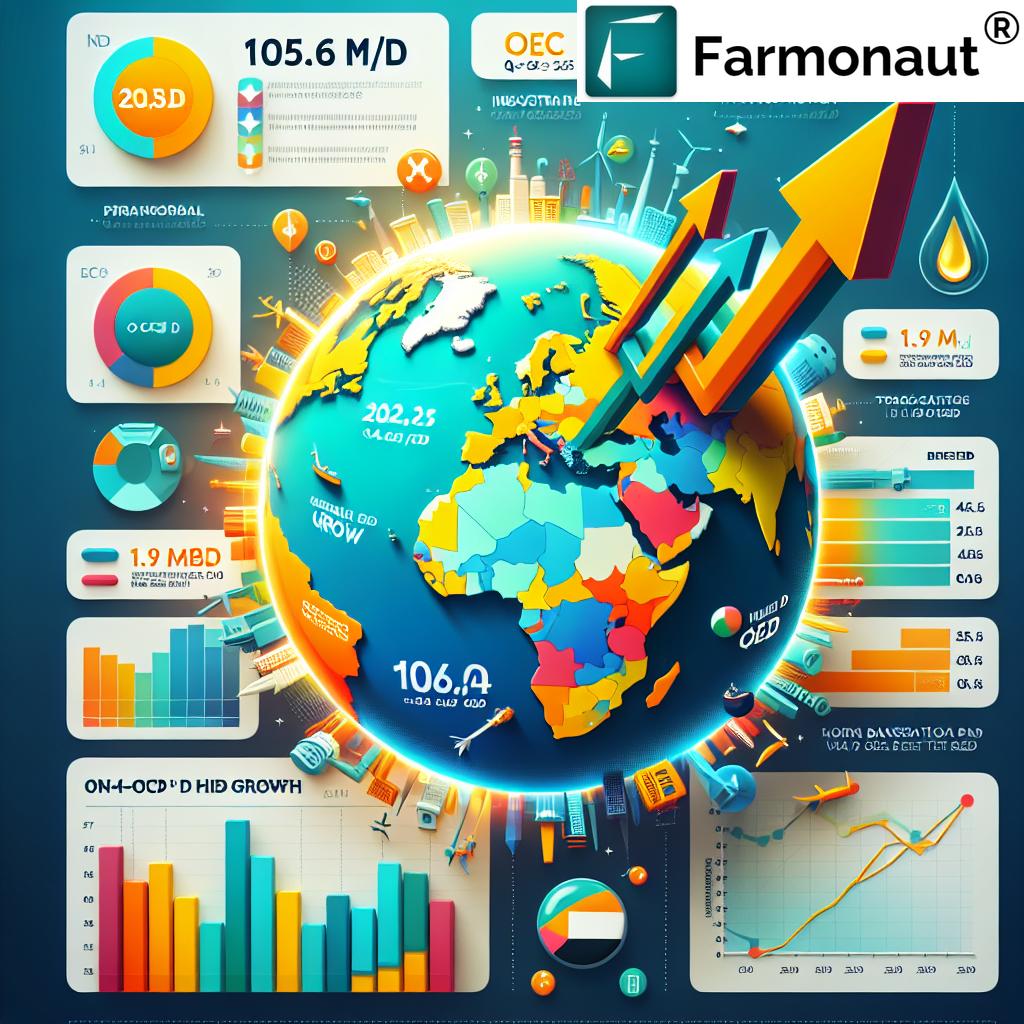Unleashing the Future: OPEC’s Bold Forecast Reveals Surging Global Oil Demand in 2024 and Beyond
In a groundbreaking revelation, the Organization of the Petroleum Exporting Countries (OPEC) has released its latest monthly report, showcasing a bold forecast for global oil demand growth in 2024 and beyond. This comprehensive analysis provides crucial insights into the future of the energy sector, with far-reaching implications for economies, industries, and policymakers worldwide.

OPEC Oil Demand Forecast 2024: A Surge in Consumption
The OPEC oil demand forecast 2024 paints a picture of robust growth in the global energy landscape. According to the report, world oil demand growth for 2024 has been revised upwards to an impressive 1.9 million barrels per day (mb/d). This significant increase reflects the dynamic nature of global oil consumption trends and underscores the resilience of the oil market in the face of various economic challenges.
Key highlights from the OPEC monthly report include:
- Total oil demand is projected to reach a staggering 105.6 mb/d by the fourth quarter of 2024
- The annual average demand for 2024 is estimated at 104.1 mb/d
- Non-OECD countries are spearheading this growth, with particularly strong performance in the Middle East
These projections signify a remarkable recovery and expansion in the global oil market, surpassing pre-pandemic levels and setting new records for consumption.
Driving Forces: Middle East Oil Demand and Non-OECD Growth
A closer look at the data reveals that the Middle East oil demand growth is a key driver in this upward trend. The region is forecasted to see an impressive growth of 265 thousand barrels per day (tb/d) in the fourth quarter of 2024, with an annual average of 8.8 mb/d for the year.
This surge in Middle East oil demand can be attributed to several factors:
- Robust industrial sector growth
- Expanding transportation needs
- Increased economic activities in the region
The non-OECD oil demand increase is not limited to the Middle East alone. Other developing economies are also contributing significantly to this growth, reflecting the shifting dynamics of global energy consumption.
Transportation Fuel Demand Forecast: A Key Component of Growth
One of the most notable aspects of the OPEC report is the transportation fuel demand forecast. Despite ongoing efforts towards electrification and alternative fuels, traditional petroleum-based transportation fuels continue to show resilience and growth. The demand for gasoline, diesel, and jet fuel remains promising, driven by:
- Increased global travel and tourism
- Recovery in commercial transportation and logistics
- Growing personal vehicle ownership in developing economies
This trend underscores the continued importance of oil in the global transportation sector, even as the world moves towards a more diversified energy mix.

Refinery Capacity Expansion: Meeting Growing Demand
To meet the projected increase in oil demand, significant refinery capacity expansion is underway, particularly in China and the Middle East. These expansions are crucial for ensuring a stable supply of refined products to meet the growing global demand. The report highlights:
- New refineries coming online in key consumption regions
- Upgrades to existing facilities to improve efficiency and output
- Strategic investments in refining capacity to meet long-term demand projections
These developments in refinery capacity are expected to play a vital role in shaping the oil market landscape in the coming years.
Explore Farmonaut’s Satellite API
World Oil Demand Projections 2025: Looking Beyond the Horizon
While the focus of the report is primarily on 2024, it also provides valuable insights into world oil demand projections 2025. The outlook for 2025 suggests a continuation of the growth trend, with several key factors influencing future demand:
- Ongoing economic development in emerging markets
- Technological advancements in oil extraction and refining
- Geopolitical shifts and their impact on global energy policies
These projections offer a glimpse into the long-term trajectory of the oil market, providing crucial information for strategic planning and investment decisions.
Access Farmonaut’s API Developer Docs
Navigating Oil Market Uncertainties
Despite the optimistic forecast, the OPEC report also acknowledges several oil market uncertainties that could impact future demand. These include:
- Global economic fluctuations and potential recessions
- Accelerated adoption of renewable energy sources
- Policy changes related to climate change and emissions reduction
- Geopolitical tensions affecting oil production and trade
Understanding and preparing for these uncertainties is crucial for stakeholders in the oil industry, from producers and refiners to investors and policymakers.
Implications for the Global Energy Landscape
The OPEC monthly report highlights have far-reaching implications for the global energy landscape. As the world grapples with the dual challenges of meeting growing energy demand and addressing climate change concerns, the oil industry finds itself at a critical juncture. The projected increase in oil demand underscores the need for:
- Continued investment in oil production and refining infrastructure
- Development of more efficient and environmentally friendly extraction and refining technologies
- Balancing energy security with sustainability goals
- International cooperation to ensure stable oil markets and fair energy transition policies
These factors will play a crucial role in shaping the future of global energy consumption and production patterns.
Conclusion: A Dynamic Future for Global Oil Demand
In conclusion, the latest OPEC report paints a picture of a dynamic and growing global oil market. With world oil demand growth 2024 projected at 1.9 million barrels per day and total demand expected to reach 105.6 mb/d by the end of 2024, the oil industry is poised for significant expansion. The strong performance of non-OECD countries, particularly the Middle East, alongside the resilience of transportation fuel demand, underscores the continued importance of oil in the global energy mix.
As we look towards 2025 and beyond, the oil market faces both opportunities and challenges. Refinery capacity expansions, particularly in China and the Middle East, will play a crucial role in meeting the growing demand. However, navigating oil market uncertainties, including economic fluctuations, technological disruptions, and policy changes, will be key to ensuring a stable and sustainable energy future.
For industry stakeholders, policymakers, and investors, staying informed about these global oil consumption trends is more critical than ever. As the world continues to evolve its energy landscape, the insights provided by OPEC’s forecasts offer valuable guidance for strategic decision-making and long-term planning in the oil and energy sectors.
As we move forward, the oil industry must continue to adapt, innovate, and collaborate to meet the world’s growing energy needs while addressing environmental concerns. The future of global oil demand is bright, but it requires careful navigation and strategic planning to ensure a sustainable and prosperous energy future for all.


